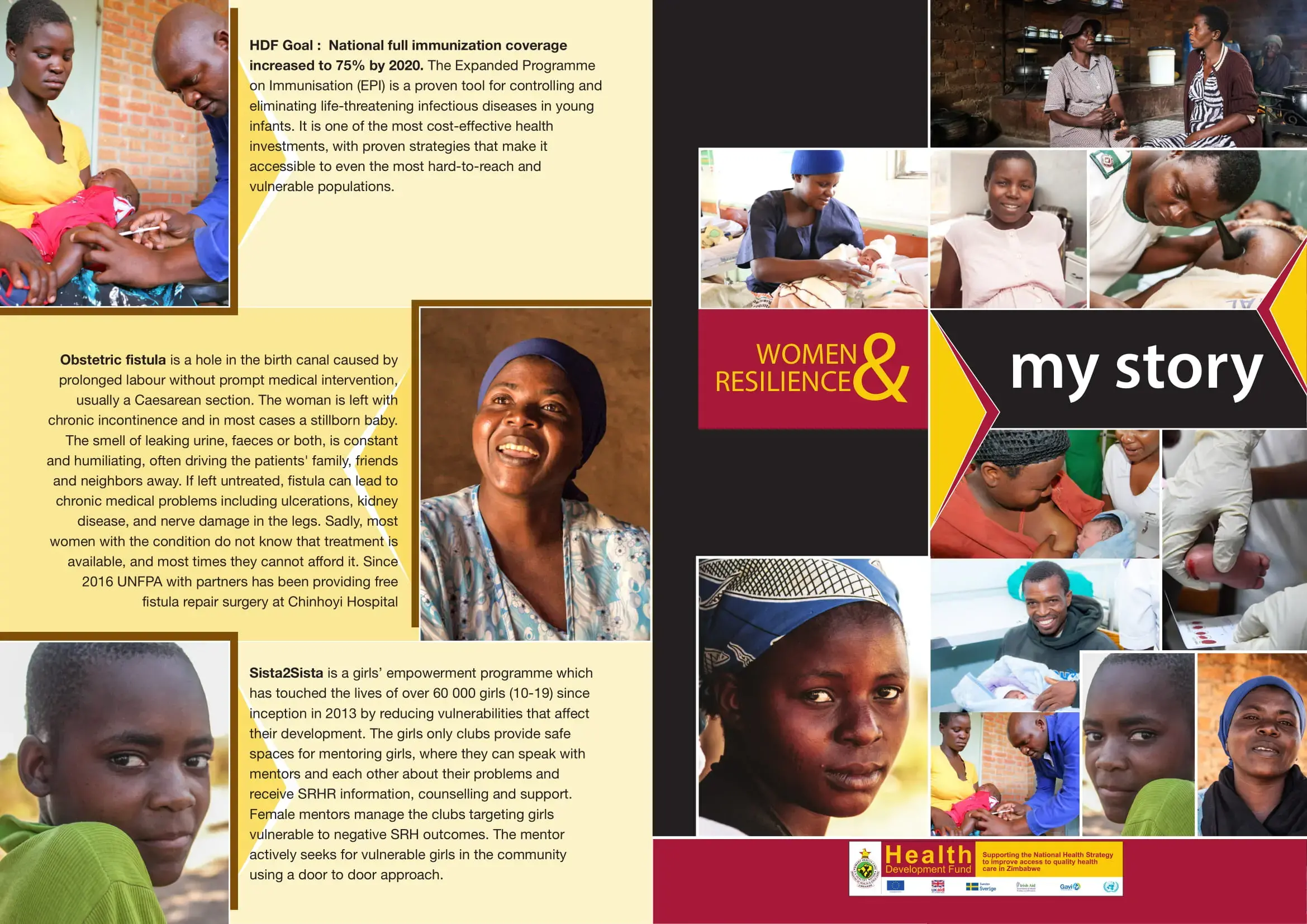Harare, 23 May, 2022 – On this International Day to End Obstetric Fistula commemorated on 23 May each year, the United Nations Population Fund (UNFPA) has called for greater support for the Campaign to End Fistula in Zimbabwe to help restore the dignity of women and girls who have obstetric fistula.
Obstetric fistula is one of the most serious and tragic injuries that occur as a result of poor management of labour and subsequently difficult childbirth. It is a tear that occurs between the birth canal with the bladder and or rectum that leaves women leaking urine, faeces or both without control. As a result it leads to social rejection, and or subsequent medical complications with infection occurring easily. If not treated in a timely way it also causes psychological or mental trauma, and eventual death if left untreated. It is caused by prolonged or obstructed labour in the birth pathway, for various reasons, due to a pelvis that is not expanding wide enough, to allow the baby to come out. Without timely access to assisted birth through emergency obstetric care, notably a Caesarian section, fistula occurs.
Women and girls with fistula are often ostracized in the society because of the unaccepted odour and endure depression and poverty because they cannot work in public with the condition. Many are abandoned by their sexual partners/husbands and families, further driving them into poverty. Their isolation means they often go unnoticed by family, community as well as policy makers and as a result, little action in the past was taken to address their condition.
UNFPA in Zimbabwe, has been working with the Ministry of Health and Child Care (MOHCC) and other partners on the Campaign to End Obstetric Fistula in Zimbabwe since 2015. This has been through the support of the Health Development Fund with financial support from the Governments of Britain, Ireland, Sweden and the European Union.
Support provided included setting up a center of excellence for fistula repair surgery at Chinhoyi Provincial Hospital where a number of repair camps are conducted. To support the campaign over 58 health personnel including nurses and doctors, were trained in the pre and post- operative management of Obstetric Fistula through a mentorship programme conducted by the Women and Health Alliance (WAHA) and the Ministry of Health and Child Care. This was through camps that were conducted every quarter in different parts of the country, supported by technical expertise from the region.
“As the world today commemorates the International Day to End Obstetric Fistula, UNFPA remains committed to continuing support to the Ministry of Health and Child Care to ensure not only the accessibility to fistula repair services for women whose lives have been negatively affected by fistula, ” said UNFPA Country Representative Dr Esther Muia. “Since the programme began in 2015 we are very happy to that we have restored the dignity of over 700 women who are now leading normal lives today.”
Dr. Muia said while corrective surgery is important, the key to addressing the problem of obstetric fistula is preventing its occurrence. From conception of the girl child nutrition is critical for bone development. The prevention of early conception to give time for the pelvis to develop to the right size to carry a pregnancy is critical, as well as nutritional guidance during pregnancy and timely prenatal care and follow up will ensure timely access to appropriate care for pregnant women.
“We must ensure that every woman delivers with skilled assistance, in a health facility, where they can access appropriate basic obstetric care and emergency obstetric care in the event that complications arise during delivery,” said Dr. Muia. “Additionally, availability and access to voluntary Family Planning information and services to those who want, would reduce the number of women dying or being injured during child birth by at least 20 per cent.”
As the lead Sexual and Reproductive Health and Rights technical partner to the Government of Zimbabwe, UNFPA continues to support Safe motherhood initiatives that promote access to and use of quality maternal health services for all women. Services provided by skilled health personnel before, during and after childbirth include emergency care for life-threatening obstetric complications, family planning to enable women to plan their pregnancies and prevent complications related to too many, too close, too early and too late pregnancies. It also includes information sharing as well as appropriate for age sexual and reproductive information and health services for adolescents and young people. It is about saving lives!
UNFPA’s work in Zimbabwe to ensure safe motherhood is being supported by the Governments of Britain, Ireland, Japan, Sweden, Switzerland, the European Union and China.
“UNFPA expresses its gratitude to these partners for this noble gesture to restore women’s health and dignity, and congratulations to the Government of Zimbabwe for picking up with earnest proactivity this critical yet often neglected part of reproductive health,” said Dr. Muia.
Dr. Muia added that communities have a role to play in preventing obstetric fistula by discouraging child marriages as young girls often get fistula injuries during childbirth as their bodies would not have matured for child birth. With the high cases of teenage pregnancy in the country the problem of obstetric fistula will continue to be a cause for concern. Nutrition for proper bone development is also key.
For any queries, information and assistance, including further information on surgery, related to fistula please call on toll free number 08080231. A team will be available to support you.
For more information and media queries please contact
Bertha Shoko, Communications Analyst--UNFPA: Tel: 263 772 782 299: shoko@unfpa.org




